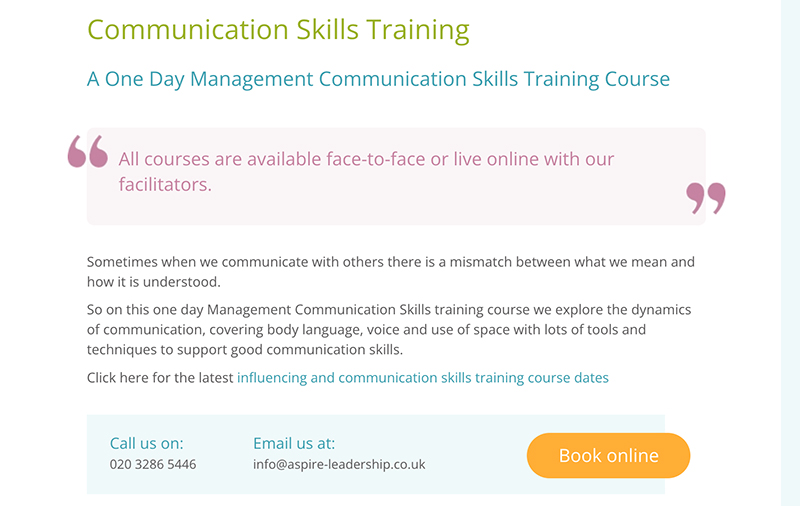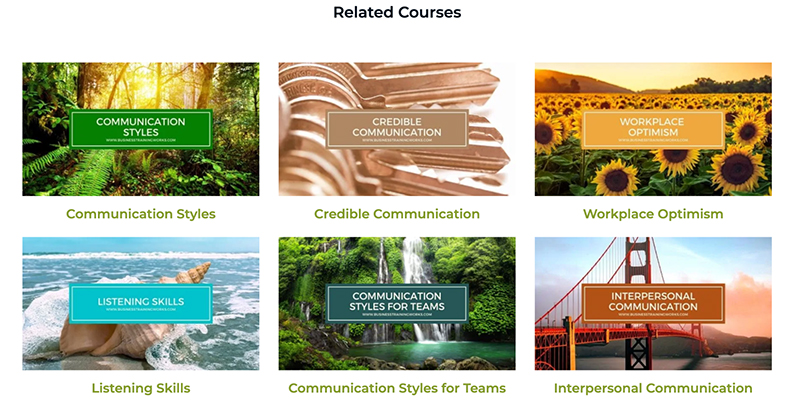Great communication is key for any successful manager. But how often do you stop to consider just how impactful your words are on our team’s performance? If you find your communication ineffective, what is the solution to improve that?
This article is your guide to communication skills training for managers, which results in better productivity and performance. Learn how to choose the right training, implement new skills, and become a communication master.
- Importance of Communication Training for Managers
- 10 Key Communication Skills Every Manager Needs
- 4 Different Methods of Communication Skills Training for Managers
- Top 4 Courses about Communication Skills Training for Managers
- How to Develop a Customized Communication Training Program
- Why Are Animation and eLearning Content Effective for Manager’s Communication Skills Training?
- Leverage Animation and Interactive Design to Enhance Communication Skills with F. Learning Studio
- Conclusion
Importance of Communication Training for Managers
Good communication is the backbone of strong management. It helps managers guide their teams, resolve conflicts, and build trust within the workplace. Here’s why communication training matters for managers.
Improve team collaboration and trust
When managers communicate clearly and openly, it sets the stage for smoother teamwork. Clear communication helps everyone understand their roles, align on goals, and feel comfortable sharing ideas. Open dialogue from managers also encourages team members to support one another and collaborate effectively, creating a cohesive, trusting work environment.
Enhance conflict resolution
Conflict is natural in any team, but good communication can make resolving it much easier. Managers trained in conflict resolution can identify issues early and approach them constructively. They listen actively, understand different perspectives, and work towards solutions that satisfy everyone.
With these skills, managers can prevent small misunderstandings from escalating. They create an atmosphere where team members feel comfortable addressing issues, leading to a harmonious work environment and stronger team relationships.
Boost employee engagement and morale
When managers communicate effectively, they show their teams that every voice matters. This builds a sense of belonging and purpose, which naturally boosts morale. Effective communication also fosters a supportive environment, where employees are encouraged to share ideas, ask questions, and express concerns.
Facilitate better decision-making
Good communication helps managers make informed and timely decisions. By including effective communication training for managers, they can learn to ask the right questions and actively listen to team input, thus gathering valuable insights that can guide decision-making.
With strong communication skills, managers can also convey decisions clearly, explaining the “why” behind each choice. This builds understanding and support from the team, helping everyone align with the goals and move forward confidently.
Increases efficiency and reduces misunderstandings
Clear instructions and expectations are key to smooth operations. Managers who communicate well make sure everyone knows what needs to be done and why, reducing chances of mistakes or delays and reducing unnecessary back-and-forth. This efficiency not only saves time but also boosts team productivity and reduces stress.
Support personal and professional growth
Communication skills aren’t just beneficial for managing teams—they’re essential for personal growth too. Strong communication skills make it easier for managers to guide their teams, handle challenges, and make better decisions. By learning to communicate well, managers become better leaders and gain skills that support their career growth.
10 Key Communication Skills Every Manager Needs
Managers need to develop various communication skills to be most effective. Let’s take a look at the 10 essential skills that are often included in communication skills training for managers.
| No. | Communication Skill | Description |
| 1 | Clear Communication | Conveying messages in a concise and understandable way to prevent misunderstandings. |
| 2 | Active Listening | Fully focusing on the speaker, understanding, and responding thoughtfully. |
| 3 | Conflict Resolution | Addressing disagreements constructively to maintain a harmonious work environment. |
| 4 | Motivation and Influence | Inspiring team members and fostering a positive, motivating atmosphere. |
| 5 | Body Language Awareness | Understanding and using non-verbal cues to reinforce messages. |
| 6 | Transparency | Being open and honest builds trust and encourages open communication. |
| 7 | Empathy | Understanding and acknowledging the feelings and perspectives of others. |
| 8 | Praise and Recognition | Acknowledging achievements to boost morale and encourage continued effort. |
| 9 | Adaptability in Communication Style | Adjusting communication methods to suit different personalities and situations. |
| 10 | Encouraging Open Dialogue | Fostering an environment where team members feel comfortable sharing ideas and feedback. |
4 Different Methods of Communication Skills Training for Managers
Communication skills training for managers can be delivered through various formats, each offering unique benefits and catering to different learning preferences. Check the most popular types to choose the one that suits you most.
Instructor-led training (ILT)
Instructor-led training involves a trainer or coach leading sessions with managers, either in person or virtually. This method allows managers to ask questions, practice skills, and receive real-time feedback from experienced instructors.
One of the biggest advantages of ILT is the opportunity for direct interaction, which helps managers address specific communication challenges they face. ILT also encourages managers to learn collaboratively with peers, promoting shared insights and techniques.
E-learning and self-paced modules
Managers are busy with various tasks and meetings, so they are likely to prefer flexible options such as eLearning and self-paced modules. This method often includes videos, quizzes, and interactive content that managers can revisit whenever needed. They can also focus on areas where they need the most improvement without feeling rushed.
Interactive simulations and role-playing
Interactive simulations and role-playing offer managers hands-on practice in real-world communication scenarios. Through simulated situations, managers can practice responding to common workplace challenges, such as giving feedback or resolving conflicts.
Meanwhile, role-playing builds confidence and helps managers become more comfortable with difficult conversations. This method prepares them to communicate more effectively when similar situations arise in their day-to-day work.
Animated training modules
Animated training modules present communication skills in an engaging, visual format. They are particularly effective for illustrating soft skills, such as active listening and empathy. With relatable characters and scenarios, managers can see these techniques in action, and better grasp and apply them in real-life situations.
If you want to refresh your training program with captivating visuals and storytelling, F. Learning Studio is willing to help. We can tailor animated videos to meet your exact training goals and ensure they resonate with learners.
interested to know more?
Glad you like us! Book a consultation call with us to explore how to kick start your animation project.
Top 4 Courses about Communication Skills Training for Managers
There are many training initiatives for managers to enhance their communication skills, and courses are always a go-to choice for many. Below, we compiled the top 4 courses on communication skills training that provide valuable insights and practical strategies.
FutureLearn
- Overview: The course “Influencing and Communication Skills for Managers” teaches managers about effective communication strategies and influencing techniques to enhance workplace interactions. It covers the role of communication in management, types of communication, and tactics for influencing others.
- Duration: 3 weeks, 3 hours per week
- Format: Online
- Key learning outcomes:
- Understand the communication process and its importance in management.
- Identify barriers to effective communication and strategies to overcome them.
- Develop essential interpersonal communication skills.

Business Training Works
- Overview: This communication skills for manager course enhances managers’ leadership skills by focusing on how to communicate and influence effectively. It includes discussions on the concept of influence, networking, and best practices for written communication.
- Duration: Varies
- Format: Online
- Key learning outcomes:
- Explore actions that influential leaders practice regularly.
- Adapt communication styles to different audiences.
- Craft persuasive written communications using storytelling techniques
Odyssey Training
- Overview: The Communication Skills for Managers course offered by Odyssey Training is designed to enhance the communication capabilities of managers and supervisors in diverse workplace environments.
- Duration: Varies
- Format: Available as in-person training or online sessions.
- Key learning outcomes:
- Recognize their own communication styles and those of their team members.
- Adapt their management style to effectively motivate individuals based on their unique traits.
- Understand barriers to effective communication and strategies to overcome them.
- Deliver constructive feedback in a way that encourages improvement and maintains a positive work environment.

Aspire Leadership
- Overview: Aspire Leadership’s “Communication Skills Training Course” focuses on the dynamics of communication, including body language, voice modulation, and spatial awareness. It emphasizes practical skills for effective management communication.
- Duration: One day
- Format: Available face-to-face or live online
- Key learning outcomes:
- Understand the elements that contribute to effective communication.
- Learn practical skills in body language and voice.
- Gain tools for managing meetings and setting boundaries while maintaining a positive demeanor

How to Develop a Customized Communication Training Program
There are a lot of online courses available for managers to hone their communication skills. However, a customized communication training program tailors learning to the specific needs of a business, making it far more effective.
Every team has unique communication challenges, goals, and dynamics, so a one-size-fits-all approach often fails to hit the mark. In contrast, customized training ensures managers and teams are equipped with relevant tools, creating a positive, productive workplace and supporting long-term business success.
Here’s a table outlining the steps to develop a customized communication training program:
| Step | Description |
| I. Assessing Needs and Objectives | |
| 1. Identify key communication skills | Define the specific communication skills to focus on, such as active listening, clear articulation, conflict resolution, or effective feedback delivery. Use surveys or interviews with team members and managers to identify areas of improvement. |
| 2. Assess current skill levels | Evaluate participants’ existing communication abilities through self-assessment, peer feedback, or direct observation during team meetings. |
| II. Designing the Program | |
| 3. Customize content to meet team needs | Based on assessments, design the program content to target relevant skills. Include essential topics such as verbal and non-verbal cues, emotional intelligence in communication, assertiveness, and effective questioning techniques. |
| 4. Select engaging training methods | Choose methods that suit your team’s learning styles, such as interactive workshops, role-playing for real-life scenarios, communication simulations, and e-learning modules. Use hands-on exercises like role-playing difficult conversations, active listening drills, and group feedback sessions. |
| III. Implementation | |
| 5. Develop a flexible schedule | Create a schedule that fits participants’ availability, offering formats like weekly sessions, half-day workshops, or short ongoing coaching sessions. This flexibility ensures maximum participation and allows for consistent skill reinforcement. |
| 6. Involve key stakeholders | Communicate program goals and benefits to relevant stakeholders, including team leaders and supervisors, to gain their support. Encourage them to monitor and support employees’ use of new skills in the workplace. |
| IV. Evaluation and Feedback | |
| 7. Measure program impact | Establish metrics to gauge program success, such as pre- and post-training assessments, feedback surveys, or observing changes in team interactions. Track improvements in specific skills like clarity, active listening, and feedback quality. |
| 8. Implement continuous improvement | Review feedback and assess data such as changes in peer feedback scores, participant self-assessments, and observed improvements in team interactions. Look for increases in confidence, clarity in messaging, and effectiveness in conflict resolution.Adjust future training sessions based on this feedback to ensure ongoing relevance and effectiveness in developing communication skills. |
Why Are Animation and eLearning Content Effective for Manager’s Communication Skills Training?
Animation and eLearning content are increasingly recognized as effective tools in communication skills training for managers due to the numerous benefits below:
- Keeps everyone hooked: Animated content holds attention way better than plain text. With dynamic visuals and storytelling, learning becomes engaging – keeping 85% of employees more likely to stay focused on training. Managers will absorb new information more effectively and actually enjoy the process.
- Makes the complex simple: Animation breaks down complicated topics into clear, digestible pieces. It’s perfect for managers handling complex decisions since it uses visual metaphors to make tricky concepts easier to understand.
- Boosts memory by 65%: Engaging visuals stick in our minds—boosting memory retention by up to 65%! With animation’s mix of visuals, sound, and interaction, managers can remember key details and strategies when it counts most.
Encourages hands-on learning: Adding interactive quizzes and scenarios keeps managers actively involved. They get to practice new skills in real-world simulations, so they’re prepared and confident when it’s time to put them into action.
- Works for all learning styles: Animation caters to everyone, and hands-on learners can all engage with the material in their own way, making training more inclusive and effective.
- Shows real-world scenarios: Animated training brings job scenarios to life, helping managers see exactly how to apply what they learn. This makes it easier for them to handle similar situations on the job.
- Builds emotional connections: Storytelling in animation adds a personal touch, helping managers connect with the material emotionally. This makes lessons not just memorable, but more meaningful and impactful in the long run.
Leverage Animation and Interactive Design to Enhance Communication Skills with F. Learning Studio
F. Learning Studio’s animation and interactive design elevate communication skills training to new levels of engagement, retention, and practicality. Here’s how we can do that:
Engaging and memorable training content
Animated content grabs attention better than plain text, but our solution goes beyond that. At F.Learning Studio, we use relatable characters and clear storytelling to make your training content memorable and resonant.
Our animations are designed to keep managers engaged and focused, so managers can quickly absorb new techniques they can use confidently in their everyday roles.
For example, when Integrity and Values (I&V) – a coaching organization sought a fresh approach to teaching communication and leadership skills, we helped them transition from traditional talking-head videos to engaging animated content. Our animations illustrated both theory and real-life applications, making it easier for learners to understand and practice effective communication techniques.
Practical, time-efficient learning modules
We understand that managers have packed schedules, so our training modules are designed to deliver maximum impact in minimal time. F.Learning’s content is chunked into easily digestible lessons that managers can complete at their own pace.
Each lesson delivers practical communication skills managers can quickly apply on the job. With our efficient approach, managers get valuable insights without the need for long sessions.
Customized, cost-effective solutions for every team
Every organization is different, and so are their training needs. That’s why F. Learning Studio creates tailored solutions that align with your specific goals and budget, whether it’s animated videos or interactive design for training. We work closely with teams to develop content that speaks directly to their challenges.
Our approach ensures quality training that’s also budget-friendly, providing effective tools to help managers communicate better and lead with confidence.
Conclusion
Not everyone is born with good communication skills, but they can be developed. Communication skills training for managers helps them inspire their teams, resolve conflicts, and make confident decisions. With the help of F. Learning Studio, training will become easier than ever. Contact us now to equip your managers with the skills to drive collaboration, engagement, and long-term success.
- WhatsApp: (+84) 378 713 132
- Email: [email protected]
- Fanpage: https://www.facebook.com/f.learningstudio
- LinkedIn: https://www.linkedin.com/company/f-learning-studio/

Sean Bui, the founder and creative director of F.Learning Studio, is a respected leader in the e-learning and multimedia production industry. With over 10 years of experience, he has dedicated his career to helping organizations create engaging and impactful learning experiences.
Under his leadership, F.Learning Studio has grown into a trusted partner for organizations in the education, healthcare, and corporate training sectors, producing over 2,000 minutes of educational animation.














